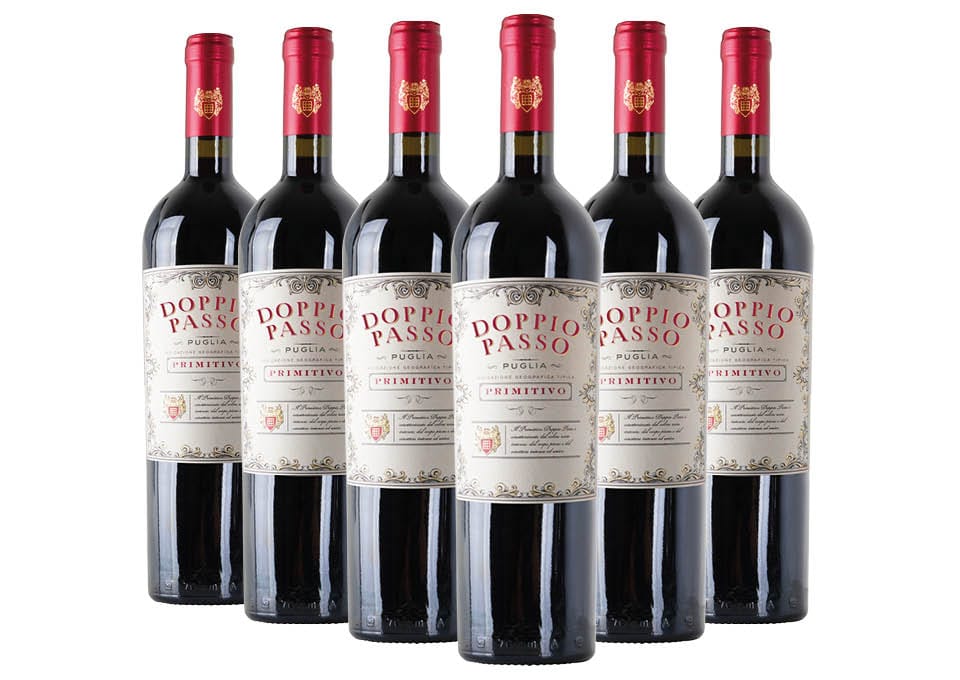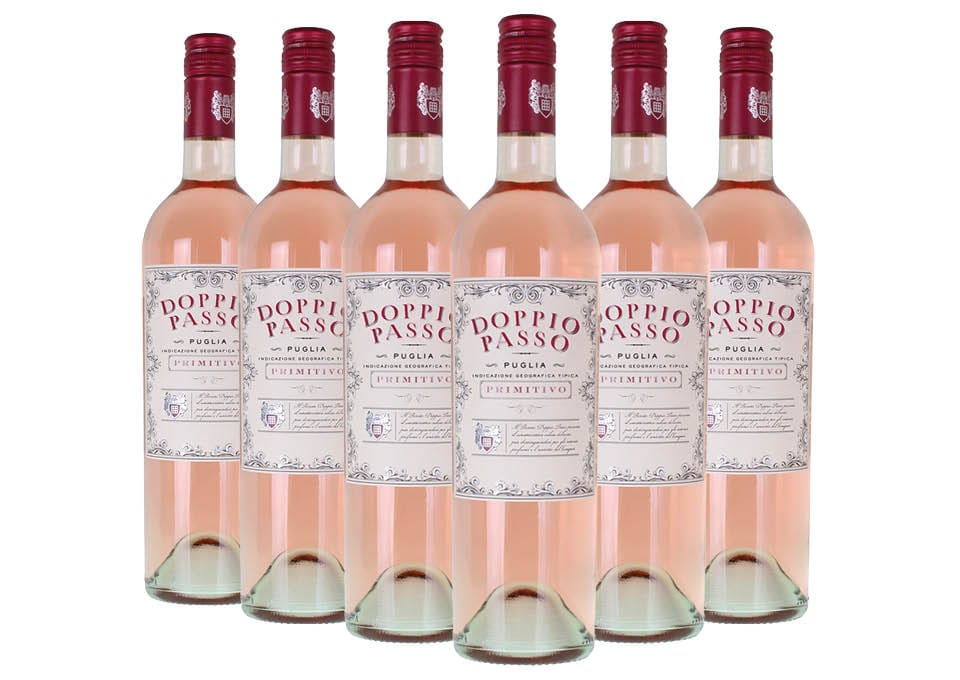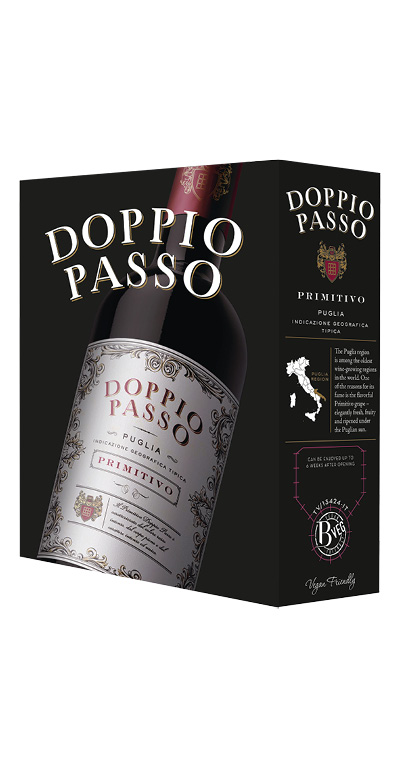Primitivo
Primitivo is a black grape variety widespread above all in southern Italy, where it finds the ideal conditions to thrive. It seems that the name of Primitivo derives from the term Primativus used in ancient times to indicate the premature ripening of grapes certified in the Apulian area. The probable arrival in Apulia thanks to the Illyrian people makes it a historically very dated vine. Showing a compact cluster, Primitivo shows great sensitivity to humidity and that is why its diffusion in ventilated areas can help its correct growth without the risk of mould. Highly productive, Primitivo is widespread in the Salento areas, in the provinces of Lecce and Taranto. Also interesting is the genetic similarity of Primitivo with the Zinfandel widespread in California which gives particularly soft and enveloping wines. Only for a few decades, given the great ability to develop a recognizable aromatic complexity, Primitivo is not only used as a blending grape but vinified in purity and in compliance with the best cellar practices. Widespread with more than 12,000 ht between the regions of Apulia, Abruzzo, Campania and Basilicata, Primitivo appears as a grape of some important appellations such as: Primitivo di Manduria, Salento, Apulia, Salento del Massico, Gioia del Colle, Gravina. Intense ruby red colour, tends to garnet with aging. The nose is dominated by red and black fruit, such as blueberries, black cherry, plum, while the ability to age in wood leads the wine to develop spicy aromas of pepper and licorice, complementing it with aromas of cocoa and tobacco dust. Soft in the tannic contribution, it is a full and enveloping wine, capable of guaranteeing great persistence. Some refined versions can also be considered meditation.
Primitivo di Manduria
The spread of Primitivo in the area of Manduria is already attested by Pliny the Elder, despite the entry of this vine into the Italian peninsula can be traced back to the Illyrians who decided to spread it before the Roman era. The discreet trade towards the East of the area's wines was so intense in the Middle Ages that the name 'Brindisi', a city famous for its port, could soon represent, as it will be in modern usage, a wish anticipated by the drinking of good wine. From the Murge area, Primitivo begins to spread in Salento, finding ideal conditions for early ripening: a substantial difference compared to the wines produced in the Gioia del Colle area and consisting of greater body and alcohol content, probably developed for higher temperatures and better conditions for the maturation of the sugars, it was not enough to save Primitivo from its use as a blending wine intended mainly for the French market. Primitivo prefers clayey-calcareous soils and is particularly affected by drought conditions. With a harvest usually carried out at the end of August, the bunches are harvested by hand and the vinification takes place immediately to preserve the integrity of the fruit. Of the 900 ht included in the Primitivo di Manduria appellation, about half are dedicated to the cultivation of the Primitivo grape, while the remainder is dedicated to Negroamaro and Malvasia. The production disciplinary of Primitivo di Manduria DOC provides for a maximum yield of 9 tons per hectare with a yield of grapes not exceeding 70%, the origin of the grapes from company vineyards, the presence of Primitivo for at least 85%. Primitivo di Manduria has an intense ruby red colour and releases aromas of plum and red fruits on the nose that evolve into cocoa, tobacco and oriental spices for a strong body, soft and pleasant tannins, great persistence and roundness.
What are the characteristics of Primitivo?
Primitivo is a grape capable of guaranteeing representative and territorial wines. It lends itself well to the creation of blends, but best expresses its characteristics even when vinified alone. Among the characteristics of Primitivo it is possible to identify a great richness of fruit which is expressed in terms of aromatic fragrance and extract. It is able to guarantee full-bodied and full-bodied wines, with very evident hints of plum, blackberry, strawberry, cocoa, licorice, tobacco. Long sip and great compactness on the palate.
Which food does Primitivo go best with?
Served at a temperature of 18-20°, Primitivo lends itself to many combinations of regional and national cuisine. In the less refined versions, it can accompany meat sauces, legumes and medium-aged cheeses. The best combination for a Primitivo with body and structure can consist of grilled meats, sheep, lamb or boar stewed or baked. The younger versions are also suitable for first courses with meat sauces or legume soups. A very convincing combination leads it to accompany cold cuts and grilled vegetables.
What is the alcohol content of Primitivo?
Primitivo is rich in sugars and therefore able to develop a high alcohol content. The production disciplinary sets the minimum alcohol content at 13.5% for the Primitivo di Manduria, while it is 14% for the Primitivo di Manduria Riserva version.
Puglia IGT Uno di Uno Rosé 2024 Lupo Meraviglia
The Primitivo rosato Uno di Uno Rosé Lupo Meraviglia is inspired with its label by the coat of arms of the city of Lecce, located just behind the "Masseria", which represents a wolf under an holm oak tree.
The must of the Primitivo grapes are left to macerate in contact with the skins for 12 hours, then softly pressed and fermented at 16-18 ° C in steel vats. The wine is then stored at 17-18 ° C always in steel until it is bottled.
Rosy in color, the nose reveals aromas of rose and violet, blueber...
View product pagePuglia IGT Primitivo 2024 Doppio Passo
This Primitivo is a product of the Doppio Passo brand, a tribute to Carlo and Maria Botter who, together, founded the company in 1928, building it step by step, day after day, working together to achieve a common goal.
The wine is made from 100% Primitivo grapes, which are harvested at two different times, at maturity and at a later time. Once in the cellar, the grapes are vinified in steel vats at a controlled temperature. Subsequently it refines for a few months on the fine lees before being bo...
View product pagePuglia IGT Primitivo 2024 Doppio Passo

Puglia IGT Primitivo 2024 Doppio Passo
The Primitivo bag in box is a product of the Doppio Passo brand, a tribute to Carlo and Maria Botter who, together, founded the company in 1928, building it step by step, day after day, working together to achieve a common goal.
The wine is made from 100% Primitivo grapes, which are harvested at two different times, at maturity and at a later time. Once in the cellar, the grapes are vinified in steel vats at a controlled temperature. Subsequently it refines for a few months on the fine lees befor...
View product pagePuglia IGT Primitivo Rosé 2024 Doppio Passo
This Primitivo Rosé from the Doppio Passo brand is a tribute to Carlo and Maria Botter who, together, founded the company in 1928, building it step by step, day after day, working together to achieve a common goal.
The wine is made from 100% Primitivo grapes, which are harvested by hand. The must obtained from the pressing of the grapes remains in contact with the pomace for about 12 hours. Once pressed, fermentation takes place in steel vats at a controlled temperature (16-18 ° C). Finally it ag...
View product pagePuglia IGT Primitivo Rosé 2024 Doppio Passo

Puglia IGT Primitivo 2024 Botter
This organic Primitivo is produced by the Botte, which since 1928 has dedicated itself to the production of iconic Italian wines.
Primitivo grapes are vinified using the traditional "submerged cap" system, with maceration lasting 12–15 days at a controlled temperature (max 25 °C). Ageing takes place both in steel and in barrels.
Intense purple in colour, the wine is expressed on the nose with notes of cherry and plum jam, in addition to notes of tobacco, coffee and vanilla. The taste is well struc...
View product pagePuglia IGP Primitivo Rosato 2024 Paolo Leo
Paolo Leo's Primitivo Rosato is a wine from the Puglia denomination, produced in the rural area of Manduria and Sava, in the province of Taranto. This rosé is obtained exclusively from Primitivo grapes, grown with the spurred cordon training system on medium-textured soils.
The harvest is carried out manually in the last ten days of August, after which the grapes undergo a short cold maceration of 5-6 hours to extract delicate aromas and flavours, followed by soft pressing. Fermentation takes pla...
View product pageSalento IGT Rosé di Primitivo Tramari 2024 San Marzano
Rosé Tramari was born in the splendid vineyards of the Apulian company San Marzano, in the heart of Salento.
This wine is made exclusively with Primitivo grapes, harvested in the first week of September and carefully selected by hand. Subsequently a partial racking of the must of Primitivo grapes takes place, cold macerated and then fermented in white. There follows a period of stabilization and refinement in the bottle before being placed on the market.
Light pink in color, Tramari di San Marzano...
View product pagePuglia IGP Primitivo Rosato Maccone 2024 Donato Angiuli
The Rosé Primitivo di Angiuli Donato belongs to the Maccone line and comes from the vineyards located in the municipality of Acquaviva delle Fonti, in the province of Bari.
This rosé wine is made exclusively from Primitivo grapes, harvested by hand at the end of September. After soft pressing, the must is fermented in steel tanks at a controlled temperature for 10 days, and then always refined in steel on the fine lees. After six months in the bottle, the wine is marketed.
Quite intense pink color...
View product pagePuglia IGT Primitivo Bio 2024 Doppio Passo
This Primitivo Bio of the Doppio Passo brand is a tribute to Carlo and Maria Botter who, together, founded the company in 1928, building it step by step, day after day, working together to achieve a common goal.
The wine is an organic Primitivo made from 100% Primitivo grapes, which are harvested in two phases. Once in the cellar, the first part of the grapes are de-stemmed and vinified with 7-8 days of maceration on the skins. Alcoholic and malolactic fermentations take place in steel tanks at a...
View product pagePuglia IGT Primitivo Desire Lush & Zin 2024 Pasqua
The Primitivo Desire Lush & Zin by Pasqua is a wine that expresses the intense and enveloping character of Primitivo, one of the most representative grape varieties of the region. The grapes come from selected vineyards and are hand-picked to ensure a perfect balance between ripeness and freshness. The Apulian terroir gives the wine extraordinary aromatic intensity and an elegant structure.
Winemaking begins with destemming and crushing, followed by a low-temperature pre-fermentation maceration f...
View product pagePuglia IGP Primitivo 2024 Notte Rossa
The Primitivo di Puglia Bio by Notte Rossa comes from Salento, from sandy soil located at approx. 100 masl
At the beginning of September the harvest takes place, which once arrived in the cellar are de-stemmed and left to macerate in vats at a controlled temperature (25 ° C) for the time necessary for alcoholic fermentation. This is followed by pressing, malolactic fermentation and aging, again in steel.
In the glass the wine appears of an intense ruby red with purple nuances. On the nose there ar...
View product pageSalento Primitivo Rosato IGT 2024 Notte Rossa
This Salento rosé comes from the Notte Rossa vineyards located near the Ionian coast, a sunny area caressed by the wind.
Composed of only Primitivo grapes, harvested during the first week of September, it is the result of maceration on the skins for a few hours and, subsequently, of an ageing in steel only.
It shines in a soft pink colour. The scent is fresh, summery, with hints of Mediterranean scrub enlivened by fruity notes that evoke cherry and raspberry. On the palate it is elegant and balanc...
View product pagePuglia Primitivo IGT Neprica 2024 Tormaresca
Nèprica Primitivo rises from the vineyards of Tormaresca which extend along the Adriatic coast of Apulia, contained between the pine forests and the sea. The company's goal is to produce great wines from the region's native vines.
It is produced exclusively with Primitivo grapes. After pressing, the must ferment in stainless steel for 8–10 days at a temperature kept below 26 °C. Once the malolactic fermentation is over, the wine ages first in steel for 8 months and for another 4 months in bottle....
View product page












